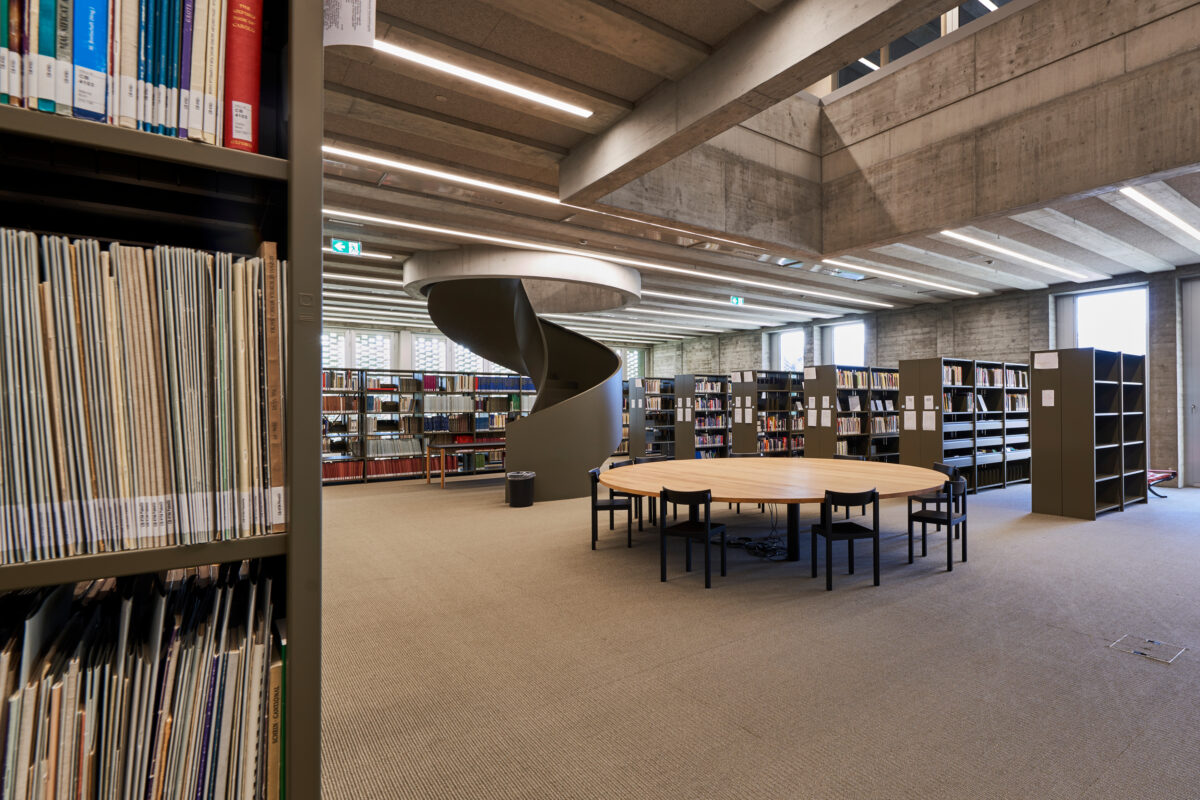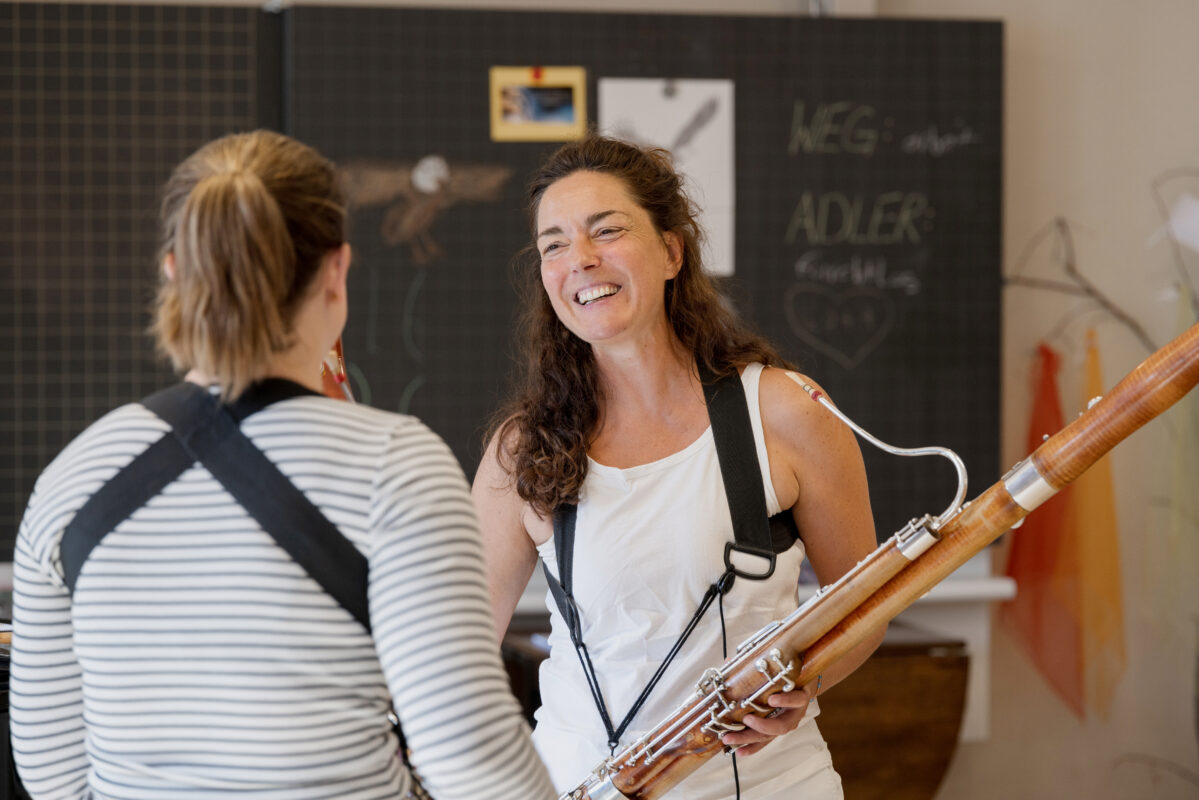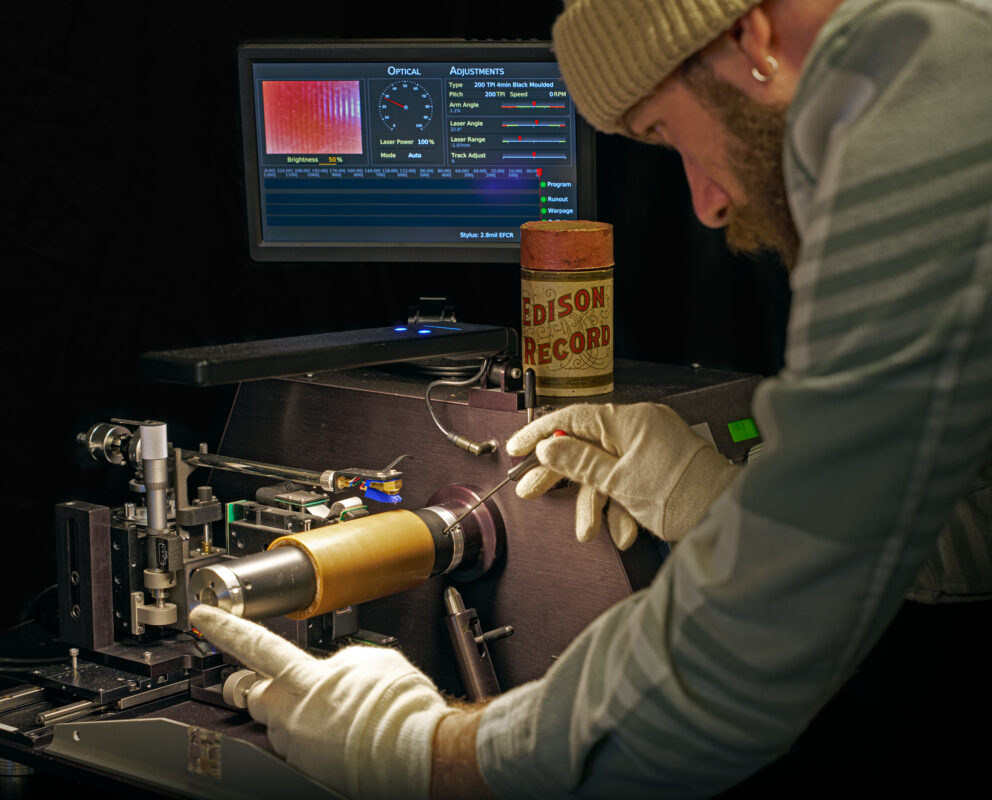Musicking (M)others
This contribution is based on fragmentary stories and forms of becoming in and with passionately un/planned projects with consequences: un récit de musiciennes mères - three artists talk about their lives as musicians and parents.
Zainab Lascandri aka Signup (Z), is a parent and a Black transdisciplinary artist. Z lives in Zurich and has been part of the electronic pop, punk, rap, techno, new wave music duo " None of Them " since 2012. H spoke to Z by phone. Claire Huguenin (C) and Malcolm Braff (M), jazz musicians, live and work as artists, mother and father, founders and co-founders of the Maison-Matrice, both an associate artistic center and their place of residence, located in the Jura bernois in Crémines. We met C and M with them at the "Maison-Matrice" in Crémines. The following scene takes place on a dark afternoon at the end of the morning, when their children and ours play in front of the old scierie together with other residents of the house.
In front of the old sawmill of the Maison-Matrice :
Enfant : Mamaaaaan j'ai faim
C : alors il faut faire le feu
H : SONART proposed to us to write about a crucial moment in life and career - becoming a parent. An article on the repercussions, the advantages and the disadvantages of having children as musicians... but...
C : HAHA !
M : Vous voulez faire de la musique ? Avez-vous pensé à faire des enfants ?
CMHR : *rigolade
A week earlier entre Bienne et Crémines, avec C on the phone :
C : (takes off.) alors la vie d'artiste... tu vois en ce moment je sutout surtout maman de trois enfants et co-gestionnaire de la Maison-Matrice. I give occasional concerts or recordings, and I see these moments as a respiration in relation to my daily life as a very busy demeurant.
H : Mais avec la Maison-Matrice tu te dévoue à un projet culturel, de partage et d'accueil artistique. And the children are also part of it - that's also what interests us.
Scene from the music video "Hyenas on the Beach" by "None of Them": In the earth-colored room \ a black guitar case upholstered in flesh ochre \ in it a brown sewage pipe phallic \ behind it the black child \ the microphone the umbilical cord the cable \ slides down \ the pipe the opening the hole \ through the case \ a "Hey" \ the person at the end \ of the open sewage pipe\Signup sings into the microphone
Avec Z au Téléphone :
Z : I became a parent when I was 23, in 2004. In many situations - unless someone asked me specifically - I never actually said: I am a parent. There is a risk involved in saying you are a parent. Because the capacities are different, the risks for working together. And also for the image. Especially in the context of performance or music and when you're on stage. So - I don't see it like that anymore - but in a way, your attractiveness is at stake.
C : Is the mother the antinomy of the séduisante woman? I have the memory of a photo on this subject, of an American singer who made voices on the piano and who at the time was sitting in a chaise à bascule, her feet in her belly, a rifle in one hand and a cochonnet in the other. Il y avait clairement une notion de matrone.
Z : This struggle with my (self-)image of the parent read as a mother, and my artistic identity as a musician - that was actually something that accompanied me. This dark side in my music represented an echo of this state. It's also the visual of our music videos that reflects this insecurity with the character of the mother. I couldn't identify with it at all. I decided at some point: ah ok, there are different ways to be a parent.
C : Where certain people have a regulated day - like paper to music - with us, these are especially the major axes that are clear. For example: I am fully available for the family, I watch my children on demand during their first three years. Our presence is therefore maximized at the house, we also go to school at home, and in terms of the precise schedule of the day... well, it's very jazzy, especially with the affairs of the association, which are always disruptive.
Z : And I can go my own way, even if I don't have many role models around me. It was a lonely path.
C : The desire to be a mother was current at the time of the launch of Maison-Matrice, a spontaneous desire to be a mother in an extremely radical way, combined with the desire to be useful, the desire to serve. What I didn't want was to live in a "prototype" apartment with our family, I needed to open up and I had every interest in placing the family home in a place like this.
M : For me, there is a desire not to close the spheres of life. And in fact, sometimes with Claire you find yourself with a baby who's on stage while you're training to do our concert as a duo...
C : Oui or bien je m'arrête au milieu du concert pour allaiter, et je continue de chanter avec bébé dans les bras.
M : Yes, so there is a real need to integrate all aspects of life into a single, multiple reality. And now we are probably in the phase of *cris d'enfants sur baby(tele)phone* ah cette fois il est réveillé ! *pause*
M : I had the phase or the fact of having children was seen as a detriment to my own art and my time of creation. This sentiment for me was really deconstructed when I decided to put my ego into my role as an artist. If everything is deconstructed, it's much less tendu, it's much less in friction - I think.
Z : When I got pregnant I was still living in a shared flat. My idea was always that I could raise my child in this shared flat *laughs* which didn't work out. And then we lived with the father of my children in this small family, cooperative apartment, which didn't make me very happy. But we had a lot of support from his parents, especially his mother, and also from friends. With the first child, I totally used my network *laughs*. I also wanted my child to be raised by different perspectives and people. It then became much more difficult with the second child. And then after the separation - as a romantic relationship, so to speak - we continued to live together as a family for another 6 years. I think it would have been different if I'd had the financial means to do things differently. Most things stand and fall with financial resources. I later moved into a shared flat and was the person who commuted. I was always half in the family home - where my father lived permanently with the children - and half in the shared flat. And we did that until the kids were like: "Hey, it's ok. Just come and cook, you can go home later." By then they were teenagers. And before that, I just slept in one or the other child's bed. So I didn't have my own room. I was always like this: child 1, child 2.
M : And then, with the arrival of the third child, you clearly live a little bit more.
The man in the caravan dazed \ with glasses in virtual worlds \ immersed the mother with cutter \ knife in hand sings \ " I don't know what to do to kiss " \ " I'm like " the hand the knife \ a cut in the stomach the blood \ " A quarter in a quarter in a house \ A small space to here \ And I don't know where to go \ But I don't know where I can lay."
Z : My children's father had a bar. It wasn't so child- and family-friendly. But that's why it worked. Because he was there in the evenings. We still had family ties. And I still have a close relationship with his parents. I think we somehow managed that well *laughs*. Yes, that was what we wanted - or tried - I think.
C : One functions above all with a spontaneous division of roles, in the family as well as in the association. I think there is a deficit at the end where there is sometimes a lack of awareness of the tasks to be carried out, of understanding of the issues and of availability to organize. The means are also limited and the ambition is high, so overwork is really part of the tableau.
Z : Yes, and for me it was like this: my father has lived in Freetown on the west coast of Africa since I was little. And my mother had another child of her own, who is almost the same age as my first child. And she lived in Lausanne - with her family. I lived in Zurich. And yes, she didn't really have the capacity to be a grandmother. And then the question was: when do you get a place in a daycare center? Between six months and a year old, the children had a place in a daycare center and from then on they went for at least three days. And when I was doing a bachelor's degree, they were in nursery for 100 %. I think the good thing was that I was young at the time and had energy. And the children could often spend the night with grandparents or neighbors. It wouldn't have been possible without my partner's grandparents.
In the light of the blue hour \ the black child dressed in white \ the mother on the bed \ the black body under a white sheet \ the child neatly tucked away \ the eight-armed cephalopod octopus \ in the mother's open belly \ the wound the cut \ la césarienne the hole. \ belly with the bostitch \ staples the child with " CLACK CLACK " \ to the reversal of birth \ the blood-red dead mollusk in the belly \ utérus matrice \ the white breast milk cake wafting \ fluidly deforming in the space between.
Outro : Être (m)other et musicienne, c'est composer à plusieurs mains et voix, souvent dans l'improvisation, avec des temporalités et des besoins multiples. But beyond the individual blending of parenthood and artistic practice, these récits invite us to rethink more broadly the conditions of creation: how our worlds make care work un/visible, what structures are missing and emerging, and what new collective forms of making could emerge from this. In other words, il s'agit pas seulement d'une affaire privée, but d'un terrain commun, où se (re-)mix Kunst, Leben, Ökonomie et politique.








